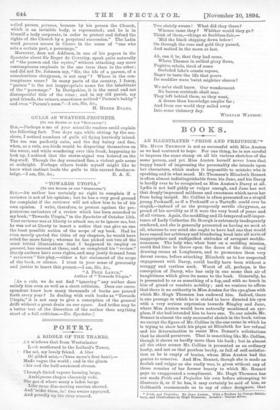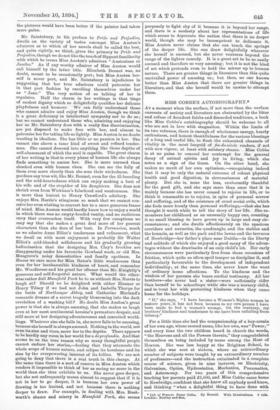BOOKS.
AN ILLUSTRATED "PRIDE AND PREJUDICE."* Mn. Huurc THOMSON is not as successful with Miss Austen as we had ventured to hope. For one thing, he is not careful to impress the same stamp on all his various sketches of the same person, and yet Miss Austen herself never loses that happy knack of impressing the personality she intends upon her characters, which makes it impossible to mistake who is speaking and in what mood. Mr. Thomson's Elizabeth Bennet is often almost indistinguishable from his Jane, and his Darcy is hardly ever to be recognised as Miss Austen's Darcy at all.. Lydia is not half giddy or vulgar enough, and Jane has not that deeply impressed mildness and sweetness which saves her from being insipid. Mr. Collins is often presented as a stupid young Peckaniff, as if a Pecksniff or a Tartnffe could ever be stupid,—instead of as the pompously servile clergyman, as proud of his servility as if it were the very bond of peace and of all virtues. Again, the meddling and ill-tempered self-impor- tance of Lady Catherine De Bourgh is extremely inadequately rendered, and she is generally presented as having no neck at all, whereas to our mind she ought to have had one that would have reared her arbitrary and blundering head into all sorts of inappropriate and undignified attitudes of arrogant meddle- Bomeness. The lady who, when bent on a scolding mission, could find time to throw open the doors of the dining and drawing rooms at Longbourn, and to pronounce them very decent rooms, before attacking Elizabeth as to her suspected engagement with Darcy, could hardly have been without a scraggy and restless neck. Worst of all, perhaps, is the conception of Darcy, who has only in one scene that air a haughtiness which gives its name to the book. Generally, he is presented to us as something of a fop, and with no touch in him of grand or resolute nobility ; and we venture to affirm that there is no authority in Miss Austen for the eye-glass with which Mr. Hugh Thomson has endowed him. Indeed, there is one passage in which he is stated to have directed his eyes with a very serious expression towards Bingley and Jane, where Miss Austen would have naturally mentioned an eye- glass, if she had intended him to have one. To our minds, Mr Bennetis almost the only successful sketch in the book, unless we except the figure of Mr. Collins in the one scene in which he is trying to show both his pique at Elizabeth for her refusal and his determination to resist Mrs. Bennet's solicitations that he should persevere. That is something like Mr. Collins, though it shows us hardly more than his back ; but in almost all the other scenes Mr. Collins is presented as an ordinary booby, and not as that peerless booby, as full of self-satisfac- tion as he is empty of brains, whom Miss Austen had the genius to conceive. And Mrs. Bennet, though she is made as foolish and vulgar as she really was, is given without any of those remains of her former beauty to which Mr. Bennet pays so exaggerated a compliment. Mr. Hugh Thomson has not made Pride and Prejudice his own before attempting to illustrate it, or if he has, it may certainly be said of him, as Goldsmith recommends us to say of other designers, that * Pride and Pr6juclica„ Ey Jane Austen, With a Preface by Oeorge Wats, bury, and Illustrations by Hugh Thomson. London: George Allen...
the pictures would have been better if the painter had taken more pains.
Mr. Saintsbury, in his preface to Pride and Prejudice, dwells on the variety of tastes amongst Miss Austen's admirers as to which of her novels shall be called the best, and quite rightly, we think, gives the primacy to Pride and Prejudice, though we do not like the touch of flippant familiarity with which he terms Miss Austen's admirers " Austenians or lanites." As if any worthy admirer of Miss Austen would call himself by the latter title. Elizabeth Bennet was, no doubt, meant to be occasionally pert; but Miss Austen her- self is never pert, and Mr. Saintsbury is injudicious in suggesting that her true admirers could patronise her in that pert fashion by enrolling themselves under her as "Jane." The very notion of so talking of her is repulsive. Half the charm in her writings is that tinge of modest dignity which so delightfully qualifies her delicate playfulness and humour. We can fully understand those who cannot admire and enjoy Miss Austen, though we think it a great deficiency in intellectual sympathy not to do so ; but we cannot understand those who, admiring and enjoying her as Mr. Saintsbury does with a really fine discrimination, are yet disposed to make free with her, and almost to patronise her for taking life so lightly. Miss Austen is no doubt wanting in idealism. She has little or no passion in her. She cannot rise above a tame kind of sweet and refined tender- ness. She cannot descend into anything like those depths of self-abasement of which the soul is capable. The great charm of her writing is that in every phase of human life she always finds something to amuse her. She is more amused than shocked even with human vices. She can see the folly of them even more clearly than she sees their wickedness. She pardons any true wit, like Mr. Bennet, even for the ill-breeding and the cold-heartedness which can enjoy making a butt of his wife and of the stupider of his daughters. She does not shrink even from Wickham's falsehood and wantonness. She is more than lenient to Henry Crawford's adultery. She enjoys Mrs. Norris's stinginess so much that we cannot con- ceive her even wishing to convert her to a more generous frame of mind. Miss Austen would hardly know how to enjoy a world in which there was no empty-headed vanity, and no malicious envy that overreaches itself. With very few exceptions we may say that she makes a great deal more of her poorest characters than she does of her best. In Persuasion, much as we admire Anne Elliot's tenderness and refinement, what we dwell on with most enjoyment is probably Sir Walter Elliot's cold-blooded selfishness and his gradually growing hallucination that the designing Mrs. Clay's freckles are disappearing under his favourite Gowland wash, or old Mrs. llusgrove's noisy domesticities and family egotisms. In Emma we care more for Miss Bates's little weaknesses than even for her inexhaustible kindness of heart, and remember Mr. Woodhouse and his gruel far oftener than Mr. Knightly's generous and self-forgetful nature. What would the other- wise rather dull Mansfield Park be to us without Mrs. Norris to laugh at? Should we be delighted with either Eleanor or Henry Tilney if we had not John and Isabella Thorpe for the butts of Northanger Abbey, and Catherine Morland's romantic dreams of a secret tragedy blossoming into the dark revelation of a washing bill P No doubt Miss Austen's great power is that she is always amusing, that she makes us laugh even at her most sentimental heroine's premature despair, and still more at her designing adventuresses and conceited world- lingo. Whatever else she fails in, she never fails to be amusing, because she herself is always amused. Nothing in the world, not even its sins and vices, move her to the depths. There appears to be hardly any room in her world for a de profundis. And that seems to us the true reason why so many thoughtful people cannot endure her stories,—feeling that they attenuate the whole scope of human nature, and eclipse its heroisins and its sins by the overpowering interest of its follies. We are not going to deny that there is a real truth in this charge. At the same time there is a sort of reserve in Miss Austen which renders it impossible to think of her as seeing no more in the world than she thus exhibits to us. She never goes deeper, but she not unfrequently seems almost to suggest that if it is not in her to go deeper, it is because her own power of drawing is too limited, and not because there is nothing deeper to draw. For example, in dealing with Mrs. Rush- worth's shame and misery in Mansfield Park, she seems purposely to fight shy of it because it is beyond her range, and there is a modesty about her representations of life which seems to deprecate the notion that there is no deeper world, though she may be incompetent to delineate it. Miss Austen never claims that she can touch the springs of the deeper life. She can draw delightfully wherever she herself is amused, but she never ventures beyond the range of the lighter comedy. It is a great art to be so easily amused and therefore so very amusing; but it is not the kind of art which pretends even to hold the mirror up to human nature. There are greater things in literature than this quite unrivalled power of amusing us ; but then, no one knows better than Miss Austen that there are greater things in literature, and that she herself would be unwise to attempt them,







































 Previous page
Previous page